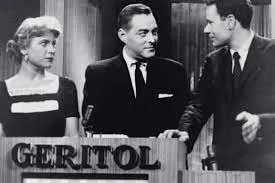On the topic of television and manipulation, nothing quite demonstrates how our attitudes have changed from the 1950’s to today more than watching the movie Quiz Show.
I had once shown it to film students, and while they loved it–I mean, who wouldn’t with that tight script by Paul Attanasio, those performances, Robert Redford’s direction, and such beautiful sets–but, at the same time, they couldn’t quite grasp what the big deal of the Twenty-One Scandal was.
And I have to confess, the first time I watched it, I didn’t really get it either.
For anyone in the dark about it, the Twenty-One Scandal happened in 1959 when it had been revealed that long-time champion of the quiz show Twenty-One and college professor, Charles Van Doren was being fed the answers by the producers. And he was part of a long line of contestants who were similarly given answers and asked to take dives to other contestants all in the name of higher ratings.
It does make sense why this would be seen as not a huge deal nowadays. To our 2022 eyes, manipulation is just part of the television product. We’ve all seen countless reality shows where we know full well the producers are pulling the strings and shamelessly stirring up drama. We’ve sat through sports scandal after sports scandal. And while game shows today might not be quite as manipulative as Twenty-One, many have sacrificed intellectual challenge for TV drama compensated with high production.
In contrast the audience in the 1950’s were at least under the assumption that they were watching television with more integrity.
An Era of Innocence
Twenty-One was one of the most watched game shows of all time. Many homes tuned into every episode, a piece of weekly ritual in the United States. Popular shows like this are something we rarely see today (even the biggest shows in recent years, like Game of Thrones and Breaking Bad had plenty of people who didn’t watch).
Was this partly because there were so few channels to choose from? Absolutely. But the reason doesn’t really matter. It was still more in the cultural zeitgeist than most content we experience today.
And it managed to genuinely hook its audience. The returning champion would come back week by week, winning more prize money. But most importantly, the champion was most often an ordinary, everyday person. The viewer would identify with this contestant, thinking of him or her as the underdog, bravely returning every week to win a chip of NBC’s riches, armed with nothing but a brain that retained a bunch of trivia. It was a mental challenge much in the same way sports were physical challenges, but unlike sports, the viewer could play along. No viewers were hitting home runs from their couches along to Babe Ruth, but they could answer some of the questions that Elfrida von Nardoff was answering and even get some of them right. That led many to think to themselves, “yeah, mayyyyybe I could be the next Herbert Stemple.”
It also gave this audience a hero.
Along with all that, it gave them drama and suspense. It had all the makings of a great movie or narrative show, but with one key difference: it was real.
All of this is what made the betrayal all the more painful.
Imagine if They Could Watch You
“The audience didn't tune in to watch some amazing display of intellectual ability. They just wanted to watch the money.”
This is a justification that Martin Rittenhome gives Dick Goodwin for how Geritol could continue to be a sponsor, knowing everything he knew. Well, at least this is the justification he offers within the movie. I’m not quite sure if he ever actually said it in real life.
We can debate whether or not he really thought this about his viewers. But what’s important is that after the Twenty-One scandal, this is the way viewers FELT these sponsors and producers thought about them.
Viewers fancied themselves as all potential intellectual champions, but after they discovered they were duped, they instead felt like a bunch of lemmings, being tricked by men in suits waving money at them.
Not only that, but their heroes, like Van Doren and Stemple, whom they thought of as brilliant but everyday men weren’t real either. Or weren’t real, at least, in the way they thought they were.
The only thing that was real was that the people in power were controlling things and manipulating everyone. The underdog taking down the system with his brains, while being cheered on by his equally big-brained audience peers, was all just a flea circus. It was really just another battle of the have and the have nots, with the former dominating as always.
Now, I have gone down a really grim path here, but I think it does ultimately point to something more positive.
The fact that people felt so betrayed does tell us something positive about humanity: many of us DON’T want to just see the money. We do, in fact, want the smart but exciting intellectual sport that game shows can be.
And, of course, there are current game shows that offer that. We have Jeopardy along with other game shows which are honest but don’t quite hit that same excitement factor.
But as noted above, we live in a world where producers shamelessly pull the strings on most content, and we’ve realized there’s no point in fighting against it. The biggest change is that the manipulation has become slightly more transparent.
And since Cideshow is about to go full into the game show division, I plan to spend a few more posts talking about what they can be and how they can actually become that thrilling, fun, and educational intellectual competition everyone thought it once was. Just with a little less money to watch.
Thanks for reading!
Check out our streaming service: https://www.cideshow.com/subscribe/




